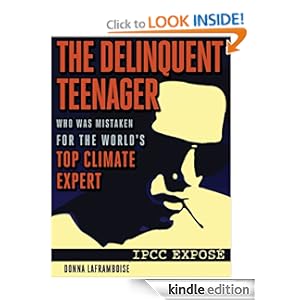Donna Laframboise’s book “The Delinquent Teenager Who Was Mistaken for the World’s Top Climate Expert: An Expose of the IPCC” is out. Negative reviews on amazon are very helpful. Forget the positive ones; they are seldom useful. Reviews that give the writer a low score are the most revealing. Often, they are witness of an informed person who has spend time on a charitable reading but who found the work nevertheless lacking for good reasons. In this case however, the negative reviews are lightning fast reactions of well known people (Scott A. Mandia, Peter Gleick) who have obviously not read the book before writing their “review”.
There is one important rule when it comes to selecting what you should read: Read what you are not supposed to read! Well established people do not want you to read “The Delinquent Teenager”. Therefore: Go read it! Read at least the extensive and free of charge preview. There is also some discussing with further free excerpts on Judith Curry's column.

You will find that this book is not about climate change, but about how the public’s trust into science is destroyed by politics, activism, and partisan scientists distorting science. The November 2009 "ClimateGate" was also not so much directly about climate as it was about how established researchers exclude critical papers from peer review for example. Any such criticism is immediately painted as “Global Warming Denial”. No surprise that this happens now with Laframboise’s book. However, the more criticism is suppressed by burning straw men instead of entering an honest discourse that allows for good arguments, the more valid and important the criticism becomes, and so I cannot but support it.
As a scientist I must reject some of Laframboise’s misleading comments about for example computer modeling. A lot of stuff should have been said differently, but then again, this is true for almost every single book out there. Especially troublesome is the perhaps unintended message that all would be much better if the IPCC (Intergovernmental Panel on Climate Change) were full of non-partisan experts, if proper science were actually in there just as the IPCC promises on its label. Only rarely are there gems that hint at the deeper roots of the problem, namely that the assumption of proper science has become naive:
“The public is supposed to accept the Climate Bible’s findings because it is a scientific document written by the world’s top scientific experts. What happens when the public discovers that those involved are actually brazen activists? What happens when it discovers that the world’s most illustrious science bodies have themselves stopped drawing the line in the sand between activists and those who strive to pursue science in a genuinely neutral and unbiased fashion?
If scientists want us to trust their expert opinions they need to behave in a trustworthy manner. If they want us to be impressed by their high standards, they need to enforce these standards.
From this perspective, the shenanigans at the IPCC shed light on a broader malaise within the scientific community as a whole.” (Emphasis added)
Now here it is that Donna Laframboise should look deeper into the issue in the future. Indeed, it is not so much politics but the social structure of science that is to be blamed for the deep crises that science is in and the justified and growing distrust of the public.
We need to seriously start this more general discussion. I keep contributing from my end inside nanotechnology and other, at most marginally climate-related issues, for example recently warning that the neutrino saga will be used to doubt global warming, which is precisely what happened a few days after. All such criticism is persistently countered with the same charge, namely that of being anti-science: You deny global warming, you deny Einstein, you want to kill babies by not vaccinating, and so on. None of these charges are true, but they stress that a big problem is being covered up unconsciously as well as consciously; why else would otherwise intelligent people resort to what is basically name calling?
Instead of letting us be fragmented, critical people need to support each other when it comes to insisting on transparency. “The Delinquent Teenager” is at least helpful in reminding us how pervasive and systemic bias is also and especially so wherever the label “Science” is extensively applied. For that reason alone, it is an interesting read.
--------------------------------------------





Comments